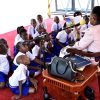Columnists
Kaduma Richard:Beat waste, build a regenerative future
World Environment Day, led by the United Nations Environment Programme (UNEP) and observed annually since 1973 on June 5th, provides a vital platform to raise global awareness on the most pressing environmental challenges like climate change, biodiversity loss, marine pollution, and plastic waste.
Supporting these efforts is the Basel Convention, a global treaty controlling the transboundary movement of hazardous waste, including certain plastics. Uganda ratified the Basel Convention in 1999, committing to regulate hazardous and plastic waste imports and exports and ensure their safe management.
While Uganda has made progress through laws like the National Environment Act, 2019 and a Plastic Pollution Management Strategy, challenges persist in enforcement, infrastructure, and public awareness. The day underscores the urgent need for collective action to halt biodiversity loss, reduce greenhouse gas emissions, combat air pollution and plastic waste, and restore degraded natural resources and ecosystems.
The theme for World Environment Day 2025 is “Beat Plastic Pollution”, with a global focus on ending plastic pollution. Nationwide, Kabale District gears up to host the World Environment Day celebrations on Wednesday, June 25, 2025. The National Environment Management Authority (NEMA), in partnership with Caritas Uganda and the National Forestry Authority (NFA), has launched pre-event activities including tree planting in selected schools of Bishop Asil Nursery and Primary School, Kigezi High School Primary School and St. Mary’s College Rushoroza aimed at instilling environmental consciousness among students and residents.
It not only addresses these environmental hazards but also aligns with the advancement of a bioeconomy, promoting the adoption of biodegradable alternatives and the development of innovative recycling systems. This transition presents a strategic opportunity to reduce plastic dependency while fostering sustainable economic growth rooted in the responsible use of biological resources.
According to UNEP, microplastics contribute to three interlinked planetary crises: the climate crisis, the crisis of biodiversity and nature loss, and the pollution and waste crisis. The world currently produces more than 430 million tonnes of plastic annually, with nearly two-thirds of this output comprising short-lived, single-use products that rapidly become waste, much of it entering marine ecosystems and, ultimately, the human food chain.
In Uganda alone, current statistics from the National Environment Management Authority (NEMA) show that the country generates 600 metric tonnes of plastics daily. About 40% of this is collected for disposal and 60% is left in the environment. Uganda’s capital city, Kampala itself generates 800,000 metric tonnes of plastic every year. Plastics contaminate water and soil with microplastics, leach toxic chemicals, spread invasive species, degrade ecosystem functions, and pollute the air when burned, making them a far-reaching threat to biodiversity, human, and environmental health.
This year’s theme aligns with several Sustainable Development Goals (SDGs), particularly those focused on combating climate change, protecting marine life, and promoting sustainable consumption and production.
The “Ending Plastic Pollution” theme directly addresses this goal by encouraging responsible plastic use and promoting sustainable alternatives like biodegradable materials and advanced recycling systems.
Plastic pollution contributes to climate change through the production and disposal of plastic waste. Reducing plastic use and promoting sustainable practices helps mitigate climate impacts.
Plastic pollution is a major threat to marine ecosystems, with microplastics contaminating oceans and harming marine life. Addressing plastic pollution is crucial for protecting marine biodiversity and the health of the oceans.
Plastic pollution also affects terrestrial ecosystems, with plastics harming wildlife and contaminating soil. Reducing plastic waste helps protect both terrestrial and marine environments.
Ending plastic pollution requires a global effort with strong international cooperation and policy discourse, but needs nation and local responsive actions, stipulated in the national policy, legal and institutional frameworks.
Uganda has put in place several laws and policies to guide how plastics are used and managed, including the National Environment Act, 2019, the National Environment (Waste Management) Regulations, 2020 and a National Strategy for Management of Plastic Pollution promoting circular economy principles.
The government has also banned single-use plastic bags, run public awareness campaigns, and worked with different groups to promote better waste management. Despite these efforts, enforcement remains weak, public awareness about the dangers of plastic pollution remains low, and the country still lacks enough infrastructure for proper recycling and disposal. Economic pressures and limited resources have also slowed down progress, leaving gaps in fully achieving the country’s plastic management goals.
World Environment Day is a call to action for individuals, government institutions, Private Sector, Civil Society Organizations (CSOs), Development Partners, Academia, Research, Religious and Cultural Institutions.
Regenerate Africa, a non-profit organisation, is committed to scaling up its initiatives in waste management, with a special focus on restoring degraded ecosystems and promoting sustainable natural resource management. The organization aims to advocate for stronger plastic regulations and alternatives and work closely with partners to champion circular economy and bioeconomy solutions.
By advancing nature-based enterprises, sustainable forestry, green innovations, and regenerative agriculture. Alongside this, Regenerate Africa actively encourages businesses to embrace environmental, social, and governance (ESG) practices that foster sustainability, ethical leadership, and long-term value creation. Guided by its vision of an Africa where human choices nurture a regenerative economy for the benefit of people, nature, and a sustainable future, Regenerate Africastrives to create livelihood opportunities while restoring ecosystems and reducing environmental degradation for a resilient, low-carbon future.
As part of the World Environment Day commemorations, the5th annual Kalanamo Heroes Marathon organized by The Great Outdoors in collaboration with Regenerate Africa will take place on Sunday 8th June 2025. Under the theme “Our Trees, Our Heroes,” the event serves as a powerful symbol of community-led climate action. Motivated by a commitment to reconnect people with nature, promote environmental stewardship, and inspire a culture of outdoor living, The Great Outdoors is more than just an eco-friendly retreat; it is a movement to restore the bond between people and nature.
By participating in the marathon, runners and supporters not only promote healthy lifestyles but also raise awareness about the urgent need to protect our natural environment. The event amplifies the call to “Beat Plastic Pollution” and reinforces the importance of restoring ecosystems, reducing waste, and embracing regenerative practices for a more sustainable, climate-resilient future.
World Environment Day serves as a reminder that the well-being of our planet is in our hands. It emphasises the importance of collective action to address pressing environmental challenges such as climate change, deforestation, pollution, and loss of biodiversity. We must act now to protect and restore our ecosystems, reduce greenhouse gas emissions, and promote sustainable practices in every aspect of our lives. We have an opportunity to contribute to a more sustainable and resilient future.
Let us embrace the principles of sustainability, stewardship, and harmony with nature on World Environment Day 2025 and beyond. Beat waste, build a Regenerative Future – Our planet’s well-being depends on it.
The author, Mr. Kaduma Richard, is the Programme Officer – Forest and Landscape Restoration
kadumarichard@regenerateafrica.org
Comments























